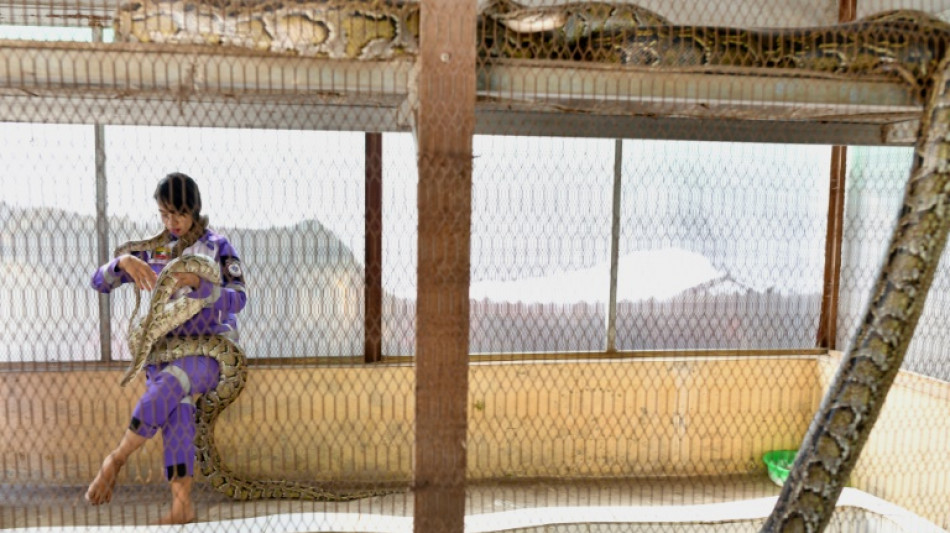
-
 England captain Stokes suffers facial injury after being hit by ball
England captain Stokes suffers facial injury after being hit by ball
-
Italy captain Lamaro amongst trio set for 50th caps against Scotland

-
 Piastri plays down McLaren rivalry with champion Norris
Piastri plays down McLaren rivalry with champion Norris
-
ECB holds interest rates as strong euro causes jitters

-
 Spain, Portugal face floods and chaos after deadly new storm
Spain, Portugal face floods and chaos after deadly new storm
-
EU close to sealing trade deal with Australia

-
 German Cup final to stay in Berlin until 2030
German Cup final to stay in Berlin until 2030
-
What does Iran want from talks with the US?

-
 Taming the lion: Olympians take on Bormio's terrifying Stelvio piste
Taming the lion: Olympians take on Bormio's terrifying Stelvio piste
-
Wind turbine maker Vestas sees record revenue in 2025

-
 Italy's Casse tops second Olympic downhill training
Italy's Casse tops second Olympic downhill training
-
Anti-doping boss 'uncomfortable' with Valieva's coach at Olympics

-
 Bitcoin under $70,000 for first time since Trump's election
Bitcoin under $70,000 for first time since Trump's election
-
'I am sorry,' embattled UK PM tells Epstein victims

-
 England's Brook predicts record 300-plus scores at T20 World Cup
England's Brook predicts record 300-plus scores at T20 World Cup
-
Ukraine, Russia swap prisoners, US says 'work remains' to end war

-
 Wales' Rees-Zammit at full-back for Six Nations return against England
Wales' Rees-Zammit at full-back for Six Nations return against England
-
Sad horses and Draco Malfoy: China's unexpected Lunar New Year trends

-
 Hong Kong students dissolve pro-democracy group under 'severe' pressure
Hong Kong students dissolve pro-democracy group under 'severe' pressure
-
Germany claws back 59 mn euros from Amazon over price controls

-
 Germany claws back 70 mn euros from Amazon over price controls
Germany claws back 70 mn euros from Amazon over price controls
-
VW and Stellantis urge help to keep carmaking in Europe

-
 Stock markets drop amid tech concerns before rate calls
Stock markets drop amid tech concerns before rate calls
-
BBVA posts record profit after failed Sabadell takeover

-
 UN human rights agency in 'survival mode': chief
UN human rights agency in 'survival mode': chief
-
Greenpeace slams fossil fuel sponsors for Winter Olympics

-
 Greenpeace slams fossel fuel sponsors for Winter Olympics
Greenpeace slams fossel fuel sponsors for Winter Olympics
-
Kinghorn, Van der Merwe dropped by Scotland for Six Nations opener

-
 Russia says thwarted smuggling of giant meteorite to UK
Russia says thwarted smuggling of giant meteorite to UK
-
Salt war heats up in ice-glazed Berlin

-
 Liverpool in 'good place' for years to come, says Slot
Liverpool in 'good place' for years to come, says Slot
-
Heathrow still Europe's busiest airport, but Istanbul gaining fast

-
 Highest storm alert lifted in Spain, one woman missing
Highest storm alert lifted in Spain, one woman missing
-
Shell profits climb despite falling oil prices

-
 Pakistan will seek govt nod in potential India T20 finals clash
Pakistan will seek govt nod in potential India T20 finals clash
-
China shuns calls to enter nuclear talks after US-Russia treaty lapses

-
 German factory orders rise at fastest rate in 2 years in December
German factory orders rise at fastest rate in 2 years in December
-
Nigeria president deploys army after new massacre

-
 Ukraine, Russia, US start second day of war talks
Ukraine, Russia, US start second day of war talks
-
Nepal's youth lead the charge in the upcoming election

-
 Sony hikes forecasts even as PlayStation falters
Sony hikes forecasts even as PlayStation falters
-
Rijksmuseum puts the spotlight on Roman poet's epic

-
 Trump fuels EU push to cut cord with US tech
Trump fuels EU push to cut cord with US tech
-
Fearless talent: Five young players to watch at the T20 World Cup

-
 India favourites as T20 World Cup to begin after chaotic build-up
India favourites as T20 World Cup to begin after chaotic build-up
-
Voter swings raise midterm alarm bells for Trump's Republicans

-
 Australia dodges call for arrest of visiting Israel president
Australia dodges call for arrest of visiting Israel president
-
Countries using internet blackouts to boost censorship: Proton

-
 Top US news anchor pleads with kidnappers for mom's life
Top US news anchor pleads with kidnappers for mom's life
-
Thailand's pilot PM on course to keep top job

| CMSC | -0.6% | 23.52 | $ | |
| GSK | 2.35% | 58.62 | $ | |
| RIO | -2.83% | 93.83 | $ | |
| BCC | -0.36% | 89.915 | $ | |
| BCE | -3.54% | 25.43 | $ | |
| NGG | -1.4% | 86.61 | $ | |
| JRI | 1.09% | 13.29 | $ | |
| RBGPF | 5.11% | 86.52 | $ | |
| AZN | 1.16% | 189.85 | $ | |
| BTI | 0.1% | 61.705 | $ | |
| RELX | 3.87% | 30.98 | $ | |
| VOD | -6.56% | 14.743 | $ | |
| BP | -2.34% | 38.3 | $ | |
| RYCEF | -1.87% | 16.62 | $ | |
| SCS | 0.12% | 16.14 | $ | |
| CMSD | -0.13% | 23.869 | $ |

Pythons on your porch? Call Myanmar's 'Snake Princess'
At four in the morning outside a Yangon monastery, Shwe Lei and her team were wrestling 30 writhing pythons into old rice sacks and loading them into a van.
It was just another day in the life of Myanmar's premier snake removal squad, prising pythons and cajoling cobras from dangerous entanglements with the human world before returning them to their natural habitat.
Stuffed into the sacks were three months' worth of work, rescued from homes and apartments around Yangon and cared for at the monastery until they are fit for release to the wild.
"I love snakes because they are not deceitful," Shwe Lei told AFP at the snake shelter run by the group, a python entwined around her body.
"If you acknowledge their nature, they are lovely."
Her mentor Ko Toe Aung, a burly 40-year-old who said he has been hospitalised seven times since he started catching snakes in 2016, was more prosaic.
Anyone in the snake-catching game has to be "fast and agile", he said.
"Wherever we catch a venomous snake, it is 90/10... It's a 90 percent chance the snake will bite me."
Their team -- called Shwe Metta, or "Golden Love" in Burmese -- has around a dozen members and rescued around 200 snakes last year from around Yangon.
Social media videos of the pair pulling snakes out of sink plugholes and extricating them from roof eaves have earned them the moniker "prince and princess of snakes" from local media.
- On the scent -
The team all have day-jobs and rely on donations for everything from their protective gear to petrol to run their purple-coloured snake "ambulance".
They mostly catch Burmese pythons -- non-venomous snakes that typically grow to around five metres (16 feet) long and squeeze their prey of rats and other small mammals to death.
Cobras and banded krait also make homes in Yangon's apartments and are a trickier prospect -- their venom can be fatal.
More than 15,000 people were bitten by snakes in Myanmar in 2014, according to the latest available figures from the World Health Organization.
Of those, 1,250 died, a fatality rate higher than many other countries, largely due to Myanmar's creaking healthcare system and patchy access to antivenoms.
It is a danger never far from the team's work.
In March, they spent two days trying to remove several cobras nesting underneath a Yangon house.
Tunnelling into the foundations as neighbours watched, their digging was frequently interrupted by the snakes inside spitting venom towards them.
"It stinks," said Ko Ye Min, 31, a tattooed member of the team, as he took a break from trying to reach the nest.
Recognising exactly which kind of stink is another skill a snake-catcher must hone, according to Ko Toe Aung.
"We have to be familiar with their smells... to identify the species of snakes before removing them," he said.
Cobras smell "rotten", he said.
"But the smell of a python is much stronger. Sometimes we even vomit when we bring it into the ambulance."
- 'Compassion' -
Through their online videos and growing fame, the Shwe Metta team hope to encourage people to be more compassionate towards the slithering reptiles -- especially if one turns up in their house.
"In the past people... used to kill snakes whenever they found them," said Shwe Lei.
"But they have more knowledge and they know we can release snakes back into the wild. So they call us to capture and remove them."
The rescued snakes are kept under observation in a nearby monastery until there are enough of them to justify a journey into the bush to release them.
In late March, the team walked into the sweltering backwoods of the Bago Yoma hills, 150 kilometres (90 miles) north of Yangon, on such a journey.
Each member carried a python in a bag slung over their shoulder until they reached a suitable spot to release it.
A few of the dazed reptiles needed gentle prods to get going, but after weeks in a cage and a five-hour car journey, Shwe Lei sympathised.
"Nobody likes the feeling of being locked up," she said after the last one had slithered off -- hopefully not to return to the human world for a long time.
"I feel happy releasing the snakes... from the point of view of compassion for each other, it is satisfying."
O.Farraj--SF-PST
